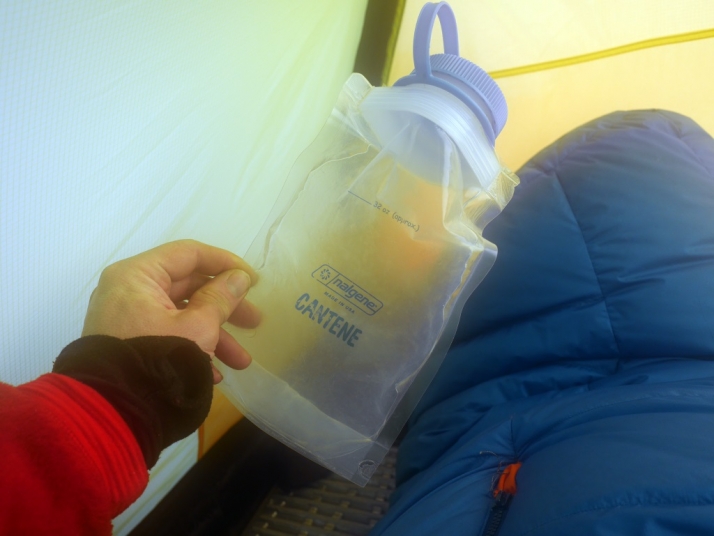Tracking
the Journey
-
Distance to go:
0 Mi
Distance
Ben and Tarka will cover 1800 miles starting from Scott's Terra Nova Hut at the edge of Antarctica to the South Pole and back to the coast again. That's equivalent to 69 back-to-back marathons hauling up to 200kg each (the weight of roughly two adult men) of kit and supplies necessary to survive.
Distances here are shown in statute miles.
Lolloping (Day 75)
Day 75: S87° 07' 2.7", E159° 35' 28.8"
Duration: 8 Hr 45 Min
Daily distance: 22.5 Mi
Distance to go: 699 Mi
Temperature: -22 °C
Wind chill: -35 °C
Altitude: 9764 Ft

For some reason I got out of the wrong side of my sleeping bag this morning, metaphorically at least, and started the day fed up with the plateau and its biting wind, fed up with my fingers and thumbs that throb painfully when they get cold, fed up with eating and drinking lying on my side in a cramped tent, fed up with wearing the same clothes for two-and-a-half months, fed up with sharing a pee bottle (see today's photo!) and feeling unusually homesick, not only for the people I love (and my dog, Molly) but also for the simple pleasures of sitting at a table, for example, walking around barefoot, drinking out of a china mug and indeed not having to use a pee bottle. All the stuff we take for granted.
My mood wasn't improved by the fact that Tarka, by his own admission, had the bit between his teeth today. His first 45-minute session was the fastest of our entire expedition and he stretched out a huge lead. I tried to keep up at first, but then slowed down, telling myself that I was still under doctor's orders (and mum's orders, more to the point) to take it steadily after being so exhausted only a couple of days ago.
Tarks and I came the closest we've ever come to a full-blown argument when I finally caught up with him to eat and drink. His viewpoint was that we're both tired and depleted, therefore we should get off the plateau as fast as we can. My viewpoint was that we're both tired and depleted, therefore we should travel steadily and conserve our energy. Neither of us was right or wrong, and both arguments had merit and wisdom, but it took a little while for me to forgive (and now laugh about) his use of the word "lolloping" to describe my pace first thing today.
We're often pretty frank with each other, and we're well aware that we both do a lot - especially in such a high-pressure, close-quarters partnership - that we each find irritating, but we've become very good at being able to speak openly without being too judgemental or offensive, and we've become unusually quick to forgive.
I've been given a couple of questions:
Q) Apparently a few people have asked if we've suffered from either "Polar thigh" (skin damage to the inner thighs, usually caused by a combination of frost/wind damage and chafing) or blisters.
A) Thankfully no polar thigh, though strangely my kneecaps got a bit battered early on, I think from the fabric of my salopettes being pulled tight against them when I sat on my sledge at breaks in high winds. I'm also happy and proud to report that we're a blister-free expedition so far. Tarka taped his feet up early on, but I've yet to use a single plaster, dressing or bit of tape on mine, which I'm chuffed with after giving my poor feet more than 1,000 miles of abuse so far. Our Alfa boots, Intuition liners and Smartwool socks have been faultless, and I'm grateful to Christian at Sportsnett in Oslo for his sage advice on that front!
Q) Someone else (alas I'm not sure who - sorry!) asked why we're not using traction kites to tow ourselves and our sledges, and why this might qualify as "support" whereas using solar power does not.
A) This could descend into pages of debate, but from the outset I wanted this to be a human-powered expedition, and an exercise in pursuing and exploring physical and mental limits. Everyone knows where the South Pole is these days, so we're not exploring in the Edwardian sense, but no one has travelled 2,900km in these conditions on foot so to me that's the area of interest. Kites have become so sophisticated and effective that it's possible to travel more than ten times as fast as we can under our own motive power, and recent expeditions have covered more than 400km per day. Some may argue that Scott used a small sail on his sledge when they had a following wind, but they certainly weren't flying along at 40 kilometres per hour, wearing crash helmets. Kite-powered polar travel has become so extremely fast and efficient that to me it bore no resemblance to the way that Scott travelled, and that success using kites depends on wind speed and direction rather than fitness, nutrition and sheer willpower. Comparing rowing and sailing is probably the simplest way of looking at it. The solar power one's interesting. If we were using vast panels to power electric skidoos then things might be different, but the electricity we generate from the roof of our tent every night only allows us to share our story; it doesn't make the pulling the slightest bit easier.










Comments
# Jon Bradshaw, January 8th 2014
I am sure that the arguments and getting on each others nerves can be the highlights of what are pretty monotonous days. Do you rant off at each other for the first half hour after you set the tent up and then once you have had your first cuppa, you calm down and laugh and enjoy each others company?
In 2008 I walked HI to SP with a guy called Shaun Menzies and we used to slag each other off for a good hour each evening in the tent before we got down to eating and chatting as friends, its a great way to let off steam. I also found that as we had been under so much stress for the whole day and were so tired, that the remarks made in frustration were often poignant and incisive, albeit harsh. I think we had 9 hours all day marching to think about things in such detail, that as soon as we had someone to vent at, we would unleash.
6 years on, its those moments arguing with Shaun that I cherish the most about Antarctica, that was her gift to me - a strong and meaningful relationship with Shaun and a better understanding of myself, which I think you can only get through interaction with others. I can see the white and the blue and sort of remember the coldness and vast emptiness of Antarctica, but I can’t feel it anymore, I think the beauty and solemnity of the place is only felt while you are there and when you fly off, the amazing thoughts and feelings you had about A, will vanish, the gift of peace and clarity of thought (two of the things I enjoyed the most about A) don’t follow you home, they are the gifts A grants you only when you spend time with her. However the relationships with your team mates and then greater self awareness developed, that is whats in your party bag to take home.
Careful back down through Shackleton Ice Falls and watch your speed down the Beardmore, don’t want you sliding on your arse into a crevasse.
Your writing is brilliant, amazed you are so eloquent under so much duress.
Jon
# Sarah Fenwick, Expedition Psychologist, January 8th 2014
Interesting reading about how you guys are openly discussing and dealing with differences of opinion and inter-personal irritations - so crucial in such challenging circumstances and close living. So good that you are really effectively using your personality strengths and managing your dark sides! http://sarahfenwick.wordpress.com/2013/11/08/scott-expedition-with-24hr-daylight-where-are-the-dark-sides/
# Lydia, January 8th 2014
Lolloping what a word - my father used to tell us to stop lolloping around and get outside and do something - not sure he would ever have thought about it in the context of Antarctica.
I am so pleased that you and DarffTarka are crossing swords every now and again, I can’t imagine there are many people in this world who have spent such times together without a crossed word or two.
As for peeing in a bag together - do you take it in turns who goes first or is there a pecking order?
Can’t tell you how darn proud we are all of you both.
Keep trucking, keep safe - we are with you every step.
Lydia x
# Snowbirdie, January 8th 2014
So that’s the formal name for the condition I had on the plateau ...polar thigh ....and painful it was!
Enjoying your blog and the progress you are making…well done guys x
# Anthea Henton, January 8th 2014
Well with a lolloping - bit between teeth combo you’re now under 700miles to go. You rock guys. Loved ones including Boogie & Molly are getting nearer. You brilliant pair.
# AlisonP, January 8th 2014
I’ve been amazed how little strife there seems to have been between you two in such extreme circumstances and continual close quarters. What counts is not whether or not you get angry with each other, but how you deal with it and whether or not you can quickly make peace of it. To that end you have done very well. I wonder if you expected to have to go so deeply inside yourself emotionally on this trip.
Thanks for showing the pee bottle. At first I thought it was one of your drink bottles! My husband keeps asking me how you deal with the other waste product. Do your have to expose your butts to the bitter cold to poo? And do your bury the waste in snow? Are there rules in the Antarctic about what to do with human waste?
Yeah, less than 70 miles to go! What a splendid accomplishment! Stay safe, the bitter winds will soon be gone and you’ll be able to breathe more easily.
# Nick, January 8th 2014
What do I think? The walk is the walk. Really tough. Even in nice heat and that’s where your problems lie solely. It’s really cold. And I know that does knock peoples minds off everything.
700 miles is still a lot, but look at Scott, this could be said a point where it went wrong for him and his team. I saw the film, black and white. Not having read any book or any literature. I’ve just seen his film. The cold in the end finished them off. 700 miles to go? Actually no, 699 miles to go ! that’s having gone an extra mile. is it not?
Staying a team is… look at kids playing in the snow. Some like an extra hour in the snow / but some begin to realise how cold it gets. I know snow tires the body through walking in it like sand and the cold is annoying. But is it the mornings that getting ready is worse than the walk itself? or is the walk worse than getting ready (in the cold)?
You may think if you argue that it’s all not worth it. But look at the difficulty Intel have faced over 100 years ! Sheer mind calculating problem solving. I mean, very tough stuff.
What about the Land Rover team and founder/s? Building an engine from scratch and calling it your creation and adding a body and chassis to that is not easy. What about the Evoque?
This is it not a thing to think about?
So I learn, there’s a side to human/system of life measures that we have to fight off in all corners of life.
So, all i’m saying is tackle these matters in a solid smart manner of walking into work with a suit and you are not taking any **** from the boss.
The ***t? is the cold and the cold is the boss.
The only alternative is to pack in or walk on. Like the film 127 hours. He had 2 alternatives.
A nice ending !
# Ann L., January 8th 2014
Dear Ben,
Thank you for replying to my question about the use of kites and for explaining how, while you are covering old ground, you are still exploring. On this blog there have been many more comments about the personal aspects of your expedition, the tests of your physical and mental strength, than there have been about the continent itself so it is pretty clear that the majority of followers find the human-powered nature of this expedition, and the human reactions to it, compelling. Thanks again for allowing us all to explore along with you.
I was also interested to read about your Smartwool socks. I have trained for 1500 meter races to marathons in all kinds of weather - freeze-eye cold (as Annie Proulx might say), pouring rain, blistering heat and stultifying humidity - here in Austin, Texas, and my feet have always remained comfortable and blister-free in Smartwool socks. Unfortunately my local running shop doesn’t stock them because the owner’s claim that no one else here buys them.
Wishing you and Tarka warm hands and strong hearts,
Ann
P.S. May I recommend for a bit of evening entertainment in your tent that you read – aloud – Annie Proulx’s short story “The Blood Bay” from her collection “Close Range.” I first read it in The New Yorker many years ago and my family and I have enjoyed reading it again countless times. I think you will enjoy her wit, the fine craftsmanship of her writing, and you may even find reason to laugh a bit at the cold.
# Sanna from Finland, January 8th 2014
Dear Ben and Tarka!
Here is something fun to play when you are skiing. Look a snowflake and discover a name to it. According to how it´s falling down or twinkeling or to its shape etc. Perhaps you will see a bee, a butterfly, an umbrella, a funnystar and so on, according to you imagination. Anyway I hope you will see in your surroundings something more fun.
Blessing!
# Leigh Phillips , January 8th 2014
When reading your blog at times it strikes me just how many attributes of a classic high performing team you demonstrate. It comes through very subtly in your writing but factors like being able to criticise openly, positively and without resentment, the mutual support and respect you both have for each other is very clear. I guess you can’t be successful in your expedition without functioning at that level but i find it fascinating to see it in action practically and far more informative than any text book or training course. Have you had to work with the team psychologist to get to that level or is it the result of all your prior experience?
# TG, January 8th 2014
i am inspired at watching you and admired with your bravery and stamina it is interesting listening to your journey and makes me realise how hard the conditions are to live in. Good luck and keep safe.
T.G Class 4
# CaninesCashews, January 8th 2014
Hi guys,
What a great mileage - well and truly back in the saddle.
I am more than impressed that it has taken 1100 miles to ‘come close’ to having a full blown argument. Once again the training, prep and teamwork showing through.
Loved the explanation about the kites. Godspeed.
Stay safe,
Gav